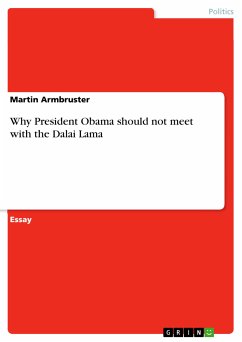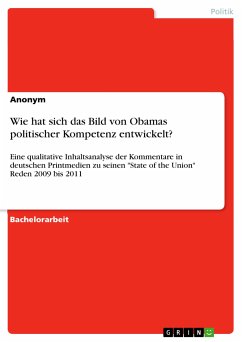Essay from the year 2009 in the subject Politics - Region: USA, grade: 2,0, Johannes Gutenberg University Mainz (Institut für Politikwissenschaft), course: US Foreign Policy in East Asia, language: English, abstract: With Barack Obama as the new President of the United States, a new charismatic figure has entered the stage of world politics. In the first months of his term, President Obama has repeatedly expressed his willingness to improve America’s relations with non-democratic countries (such as China or several Islamic countries). According to several of his statements, the President’s foreign policy toward non-democratic countries should be based on common interests and mutual respect. The President further stated that the wanted to listen, not to dictate. Concerning Sino-U.S. relations one could argue that this approach is mainly aimed at issues of common interests (such as economic issues between the U.S. and the PRC), while issues regarding human rights are left outside. Given America’s strong commitment to human rights and democracy, however, it is unlikely that any U.S.-President could afford a foreign policy where human rights issues were to be neglected. This paper addresses the question whether President Obama should meet with the Dalai Lama in order to support the struggle for Tibetan autonomy and to improve the PRC’s human rights record in Tibet. That is an important question to ask because it reflects a basic dilemma in U.S. foreign policy: the contrast between American values and American interests. From an idealist standpoint, the United States should pursue a foreign policy which promotes American core values (like freedom, democracy, and egalitarianism). From a more hard-nosed―one could say realist―standpoint, however, U.S. foreign policy should first and foremost serve American core interests. That also counts for the question raised above. While idealists surely would love to see the President with the Dalai Lama, pragmatics would rather see such a meeting as a threat to American interests in East Asia as it could strain Sino-U.S. relations. On the pages below, I will argue that President Obama should not meet with the Dalai Lama. He should not do so due to three reasons. First, a meeting between the President and the Dalai Lama would strain Sino-U.S. relations (arguably the most important relations of the U.S. in the years to come). Secondly, it could prompt Beijing to take an even harder stance on the Tibet Question which could invoke a spiral of violence in the Tibetan areas. Finally, such a meeting would undermine a more effective diplomatic approach on the Tibet issue.
Bitte wählen Sie Ihr Anliegen aus.
Rechnungen
Retourenschein anfordern
Bestellstatus
Storno









